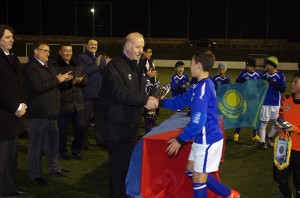ASTANA – Twelve young football players from Astana travelled to Soria, Spain, from Nov. 1 – 10 to play in the first Spanish-Kazakh youth football tournament. The young players, all aged from 10 – 12, also took training sessions with top Spanish coaches.
 The four-team tournament was arranged through an agreement by FC Astana 1964 and top Spanish club CD Numancia, who have agreed to collaborate over the next two years, Miguel Riera, international sport director of FC Astana 1964, told The Astana Times on Nov. 25. Riera chose the Kazakh players for the tournament, who are all members of the Spanish team’s academies here.
The four-team tournament was arranged through an agreement by FC Astana 1964 and top Spanish club CD Numancia, who have agreed to collaborate over the next two years, Miguel Riera, international sport director of FC Astana 1964, told The Astana Times on Nov. 25. Riera chose the Kazakh players for the tournament, who are all members of the Spanish team’s academies here.
Kazakhstan’s team came in second in the tournament, which was held on Nov. 4 and drew an audience of 600. FC Astana 1964 won their first game, 2:0, against FC CalaSanz, then drew 1:1 against FC San Jose. They lost only the final, 0:1, against FC Numancia.
Coach of the Spanish national team Vicente del Bosque, who led the team to their World Cup championship in 2010, presented the second place cup to FC Astana 1964, while President of FC Astana 1964 Galym Ibrayev presented the winning cup to FC CalaSanz.
“Our team played very well. For one full year, our children were training in order to succeed in this tournament,” Riera said. He had tried to coach Astana’s young athletes using Spanish methodologies over that year, he noted. Riera tries to bring a European, and specifically Spanish, mentality to football training in Astana in general, he said, while maintaining Kazakh traditions.
One young Kazakh player, Meirambek Kamyra, stood out for his brilliant play, Riera said. The Spanish side would like him to play for their academies in the future, as they see great promise in him as a player.
Riera is tasked with promoting Kazakh football in Europe. He says in addition, “My personal target is to promote Astana as much I can in Europe. Astana is one of the more amazing cities in the world.” The people in Astana make him feel as though he is among family, he said.
During the rest of the trip, Kazakhstan’s young team was coached by FC Numancia staff in two sessions per day.
For Numancia sporting director Cesar Palacios, the visit was “an important cultural exchange, an opportunity for young people to experience first-hand the quality of training and the facilities of Spanish football, as well as a power contact with coaches and class methods,” reported Spanish news agency Desdesoria.es on Nov. 6.
Over the next two years, the Kazakh and Spanish teams will work together in a variety of other ways. Kazakhstan’s top players will have an opportunity to test with the Spanish team during that time, and the coaches from the Spanish team will come to Astana for two or three weeks each year to train Kazakh players.
